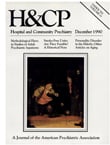Suicide and Cancer in Late Life
Abstract
In a controlled psychological autopsy study of suicide in late life, eight cases in which the victim's belief that he had cancer played a major role in the decision to end his life were examined. All victims were men. The majority bad diagnosable major affective disorders, but none had been seen in mental health care settings. Other common characteristics were an active relationship with a primary physician, numerous losses, prior experience with cancer or debilitating disease, and a rigid, self-sufficient personality style. The cases illustrate the complex determinants of suicidal behavior in the elderly and suggest preventive strategies for the primary care setting.
Access content
To read the fulltext, please use one of the options below to sign in or purchase access.- Personal login
- Institutional Login
- Sign in via OpenAthens
- Register for access
-
Please login/register if you wish to pair your device and check access availability.
Not a subscriber?
PsychiatryOnline subscription options offer access to the DSM-5 library, books, journals, CME, and patient resources. This all-in-one virtual library provides psychiatrists and mental health professionals with key resources for diagnosis, treatment, research, and professional development.
Need more help? PsychiatryOnline Customer Service may be reached by emailing [email protected] or by calling 800-368-5777 (in the U.S.) or 703-907-7322 (outside the U.S.).



